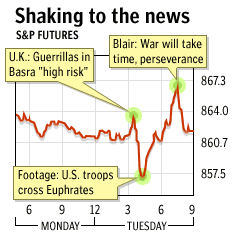NEW YORK (CNN/Money) -
The most valuable commodity that traders know of is information. It's what they want, crave, need. Get the information before everyone else, you're in before they start to buy and you're heading to the bank while they're holding the bag.
But the trick is you've got to be one of the first to know, and more, you need to understand what the information means. It's always a frantic situation, but the war with Iraq has made it downright surreal.
“ It makes the market a more dangerous playground. ”
Bill Rhodes
Investment strategist
|
"We're all flipping channels all the time, trying to differentiate between what's new news and what's old news," said Phil Ruffat, director at the futures division at Mizuho Securities USA. "I have two TVs on my desk and I wish I had more."
Television is not enough, of course. There are the major newspapers, all of which are regularly updating their Web sites with their latest reports. Then there are sites like agonist.org, commandpost.com, flit, stratfor.com, which are quick to aggregate the latest war news and spin an interpretation on it. There is DEBKAfile, the rumor-heavy Israeli site that has been dubbed the Drudge of the Middle East for the way it sometimes comes up with stained blue dresses.
"DEBKA is very popular," said Miller Tabak bond strategist Tony Crescenzi. "I look at some Arab Web sites -- arabicnews.com, albawaba.com, arabworldnews.com. There are a lot of military sites people are looking at, too, like defensedaily.com and globalsecurity.org. Some people are also going to Web sites with satellite pictures."
The intense focus on war news has made for volatile trading. Consider the action in the stock index futures early Tuesday morning. First they fell on reports that coalitions forces now considered the city of Basra a "legitimate military target" -- a change of plan that suggested steeper casualties and less resources for the fight for Baghdad. Then they flipped higher when footage was shown of U.S. Marines crossing the Euphrates River. By the open, they'd slipped back down to the flat line.

"The rule of thumb is fairly simple," said Bill Rhodes, chief investment strategist of Rhodes Analytics. "If the market believes the cost of conflict is going to rise in terms of blood and treasure, it's going to discount that and sell off. If it believes the cost of conflict is going to fall, the market is going to discount that and rise. It's really that simple."
It's a pattern that held true in World War II, Rhodes notes, when the market fell at key points like the bombing of Coventry and rose when Mussolini admitted the war was going badly for him. But these days the accelerated news flow has meant the market movements are coming much more quickly.
"It makes the market a more dangerous playground," Rhodes said. "There's all kinds of interpretations on what's happening -- look at the difference between the information being spun on Al Jazeera and CNN."
The sheer amount of news may also be coloring the markets' perception of the war, fueling expectations that it will be over in a matter of just a couple of weeks, said Credit Suisse First Boston bond strategist Mike Cloherty. But even short wars, aren't that short. The first Gulf War took 74 days. Britain's war with Argentina over the Falklands took 37 days.
| War and Wall Street
|

|
|
|
|
"People assume that because the flow of information is faster, the results will be faster," said Cloherty. And that assumption only adds to the volatility, because if you think the time frame is shorter, each new piece of news seems far more crucial than it would if you believe the war won't be over lickety-split.
The market's choppiness might be fun for traders who are lucky enough to play the currents well, but it's hell for longer-term investors. When stocks move up and down violently, as they have during the past few days, it is very difficult to know if the price you are getting is really worth it, and even if in the long run your investment does well, the short run can be filled with regret. Theory says that the more volatile the market is, the less value investors should put on it. Practice says that when the market is highly volatile, it is also highly speculative, a poker game where you can easily end up being the patsy.
Consider the investor who bought stocks on Friday, when the Dow Jones industrial average jumped 235 points. On Monday, when the Dow fell 307 points, he would have a hard time not feeling foolish.
"You do not want to try to time these short-term rallies," said Merrill Lynch strategist Kari Pinkernell of the market's chop. "The market is trading on propaganda, not fundamentals. It's crazy. There's nothing else to say."

|

